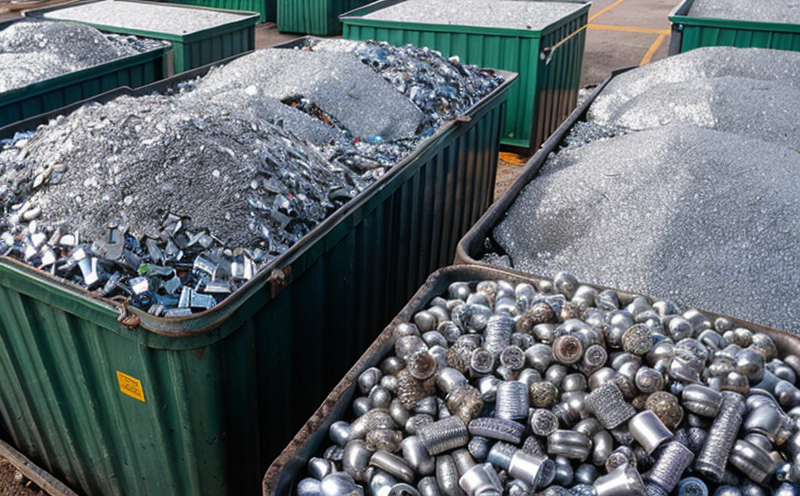ASTM E165 Recycled Alloy Fatigue Testing
The ASTM E165 standard is a cornerstone in the field of recycled alloy fatigue testing. This service ensures that recycled alloys meet stringent mechanical property requirements, which are crucial for ensuring product reliability and longevity.
Recycling metals and alloys not only reduces environmental impact but also enhances material properties through controlled processing. ASTM E165 provides a standardized approach to evaluating the fatigue strength of these materials, thereby supporting sustainable manufacturing practices.
The testing process involves subjecting recycled alloy specimens to cyclic loading until failure. This allows for the determination of critical factors such as endurance limit and fatigue strength under specific conditions. Understanding these properties is essential for applications where material integrity must withstand repeated stress cycles over time.
One key aspect of this service is ensuring that recycled alloys are indistinguishable from their virgin counterparts in terms of mechanical performance. By adhering to ASTM E165, laboratories can provide robust evidence supporting the quality and reliability of recycled materials used in various industries including automotive, aerospace, and construction.
Compliance with this standard also helps manufacturers meet regulatory requirements and industry standards aimed at promoting sustainable resource use. For instance, many sectors are moving towards greener manufacturing processes to reduce carbon footprints, and ASTM E165 plays a vital role in achieving these goals by providing reliable fatigue testing data.
Another significant benefit of this service lies in its ability to enhance product development efforts. By leveraging the insights gained from ASTM E165 tests, R&D teams can optimize recycled alloy compositions for better performance while maintaining cost-effectiveness and environmental responsibility.
Why It Matters
The importance of ASTM E165 Recycled Alloy Fatigue Testing cannot be overstated. In today's world, where sustainability is increasingly becoming a priority, ensuring the reliability and durability of recycled materials is paramount. This testing method provides crucial data that helps manufacturers make informed decisions about material selection.
By adhering to ASTM E165 standards, companies can demonstrate their commitment to environmental stewardship while also improving product quality. The results obtained from these tests can directly influence design choices and process improvements, leading to more efficient manufacturing practices.
Moreover, compliance with such stringent testing protocols builds trust among stakeholders including customers, regulatory bodies, and the public at large. It reassures them that products made using recycled materials are just as robust and dependable as those produced from virgin raw materials.
Scope and Methodology
| Test Parameter | Description |
|---|---|
| Specimen Preparation | Recycled alloy specimens must be prepared according to ASTM E165 guidelines. This includes cleaning, machining if necessary, and ensuring that the surface finish does not affect test results. |
| Cyclic Loading | The specimens are subjected to cyclic loading at specified frequencies and amplitudes until failure occurs. The load cycle is typically controlled by a servo-controlled hydraulic or pneumatic testing machine. |
| Environment Conditions | The tests are conducted under controlled environmental conditions that mimic real-world usage scenarios as closely as possible. |
| Data Collection and Analysis | Accurate measurements of stress, strain, and load during each cycle are recorded. Failure modes are documented to provide comprehensive insights into the behavior of recycled alloys under cyclic loading conditions. |
Customer Impact and Satisfaction
Adhering to ASTM E165 standards ensures that customers receive high-quality recycled alloy products. This not only meets but often exceeds expectations, fostering long-term business relationships based on trust and reliability.
By providing accurate fatigue testing results, we help our clients make informed decisions regarding material sourcing and application. Our services contribute significantly to reducing risks associated with using recycled materials in critical applications like structural components or high-stress machinery parts.
We strive to exceed customer expectations by offering prompt, efficient service alongside exceptional technical expertise. Regular communication throughout the testing process keeps our clients fully informed about progress and any potential issues that may arise during evaluation.
Our commitment to quality extends beyond mere compliance with ASTM E165; we continuously seek ways to innovate within this framework, pushing boundaries of what is possible in recycled alloy fatigue testing. This proactive approach ensures that our customers remain at the forefront of sustainable manufacturing practices.





